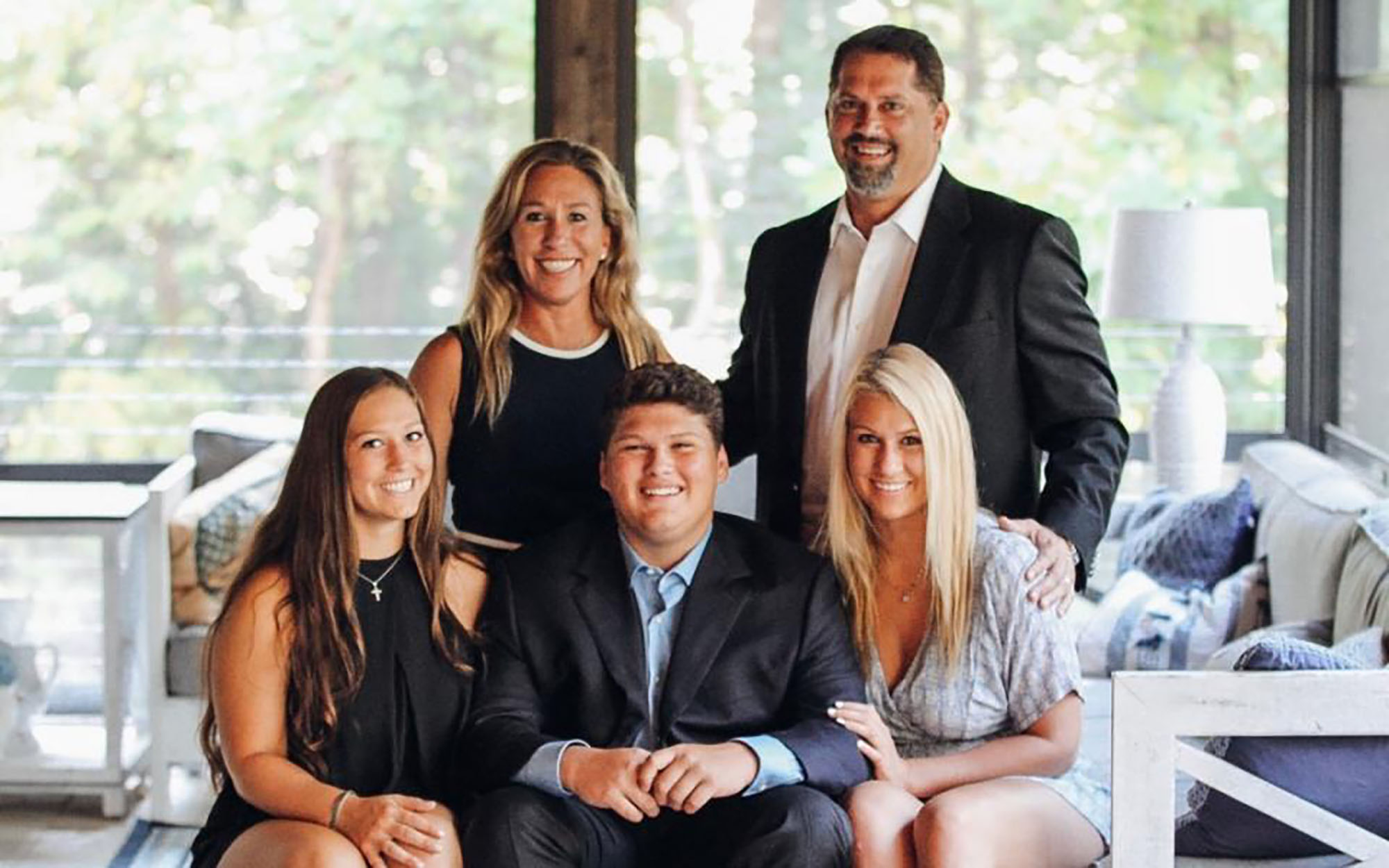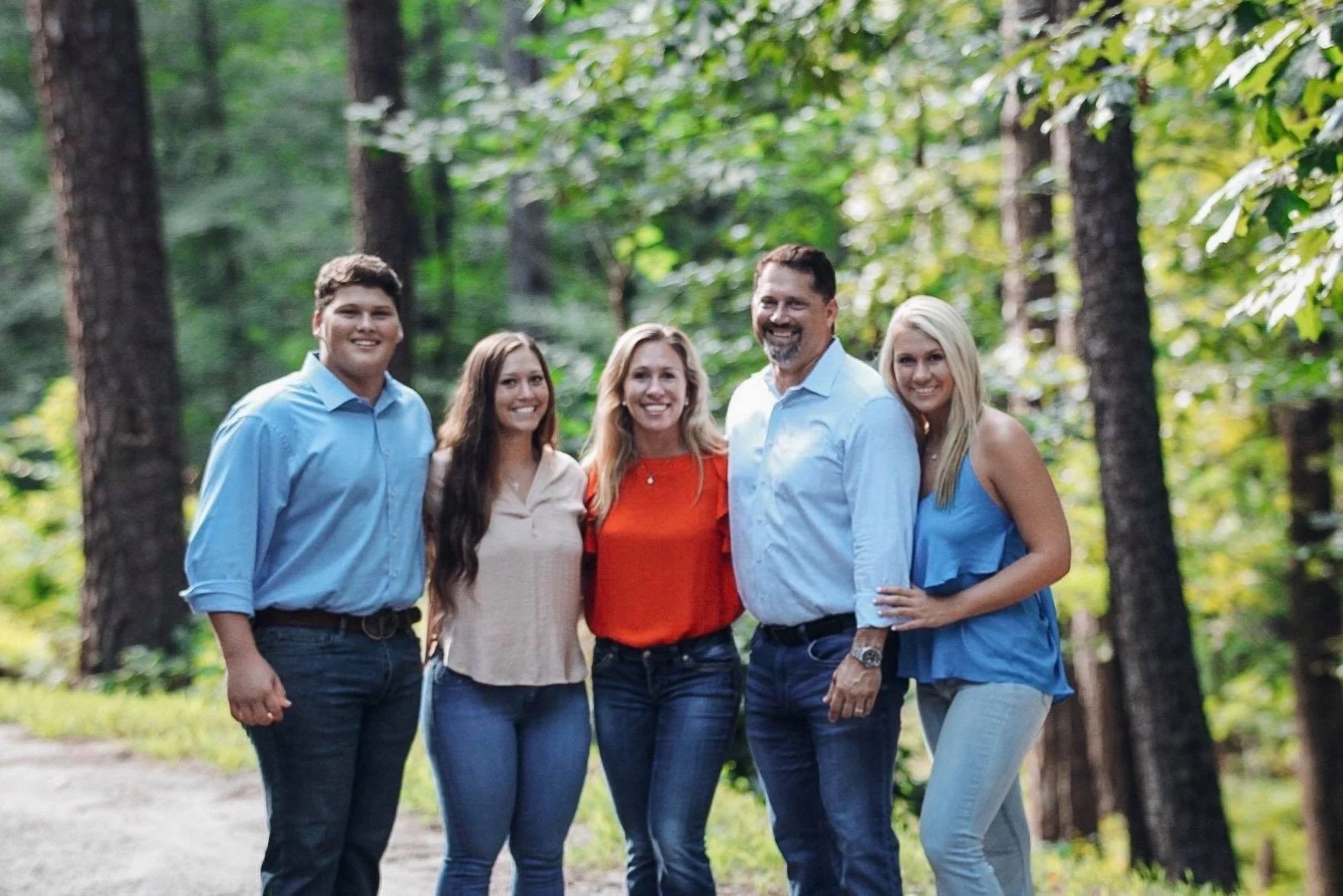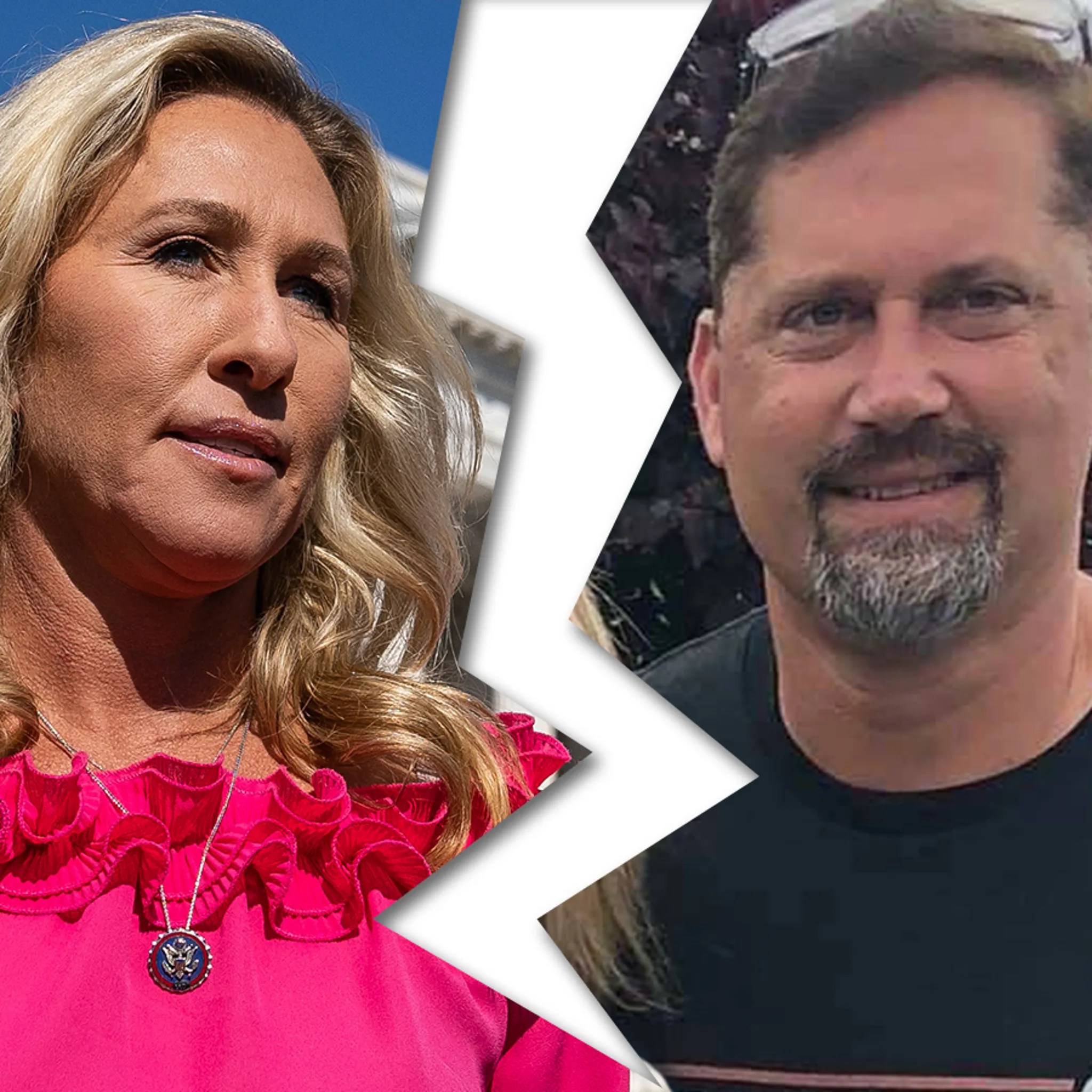Marjorie Taylor Greene is a Republican U.S. Representative for Georgia's 14th congressional district. She has three children: a daughter, Taylor, and two sons, Derek and Joshua.
Greene has been a controversial figure since her election in 2020. She has made a number of false and misleading statements, and has been accused of promoting conspiracy theories. In February 2021, she was removed from her committee assignments by the House of Representatives for her support of the QAnon conspiracy theory and her past statements endorsing violence against Democrats.
Greene's children have largely stayed out of the public eye. However, in 2021, her daughter, Taylor, spoke out against her mother's views in an interview with The New York Times. Taylor said that she does not agree with her mother's politics and that she is "embarrassed" by her mother's behavior.
Marjorie Greene's Children
Marjorie Greene's children have largely stayed out of the public eye, but they have been thrust into the spotlight due to their mother's controversial political career. Here are nine key aspects of Marjorie Greene's children:
- Number: Three
- Names: Taylor, Derek, and Joshua
- Ages: Unknown
- Gender: Two sons and one daughter
- Relationship with mother: Strained
- Public statements: Taylor Greene has spoken out against her mother's views
- Privacy: The children have largely avoided the public eye
- Education: Unknown
- Careers: Unknown
The children of Marjorie Greene have been affected by their mother's political career in a number of ways. They have been subjected to public scrutiny and criticism, and their relationship with their mother has been strained. It is unclear how the children feel about their mother's views, but it is clear that they have been impacted by her actions.
Number
Marjorie Greene has three children: a daughter, Taylor, and two sons, Derek and Joshua. The number three is significant in several ways in relation to Greene's children:
- Family dynamics: The number three represents the nuclear family unit, consisting of a mother, father, and child. In Greene's case, she is the mother of three children, which fits into this traditional family structure.
- Gender balance: Greene has two sons and one daughter, which creates a gender balance within her family. This balance can contribute to a diverse and well-rounded family environment.
- Parental responsibilities: Having three children requires a significant amount of parental care and attention. Greene is responsible for providing for the physical, emotional, and educational needs of her children, which can be a demanding but rewarding task.
- Future generations: Greene's three children represent the next generation of her family. They will carry on her legacy and values, and they may also have children of their own, continuing the family line.
The number three is a significant aspect of Marjorie Greene's family life. It represents the traditional family structure, gender balance, parental responsibilities, and the continuation of her family's legacy.
Names
The names Taylor, Derek, and Joshua are significant in relation to "marjorie greene children" for several reasons:
- Personal identities: Taylor, Derek, and Joshua are the personal names of Marjorie Greene's three children. These names represent their unique identities and distinguish them from others.
- Family connection: The names Taylor, Derek, and Joshua establish a familial connection between the children and their mother, Marjorie Greene. These names symbolize the bond and relationship between them.
- Cultural background: The names Taylor, Derek, and Joshua are common names in the United States, reflecting the cultural and linguistic background of the Greene family. These names provide a sense of belonging and cultural identity.
- Public recognition: Due to their mother's high-profile political career, Taylor, Derek, and Joshua have gained public recognition. Their names have become associated with Marjorie Greene and her family, which can have both positive and negative implications for their privacy and personal lives.
In conclusion, the names Taylor, Derek, and Joshua are important aspects of "marjorie greene children" as they represent the personal identities of her children, establish a familial connection, reflect their cultural background, and bring public recognition due to their mother's political career.
Ages
The ages of Marjorie Greene's children are not publicly known. This lack of information is significant for several reasons:
- Privacy concerns: Greene's children are minors, and their privacy is protected by law. Withholding their ages helps to shield them from unwanted attention and potential harassment.
- Personal safety: In today's digital age, personal information can easily be shared and misused. Keeping the ages of her children private helps to protect them from potential threats to their safety.
- Political considerations: Greene is a controversial political figure, and her children have been thrust into the spotlight due to her actions. Withholding their ages helps to minimize their involvement in the public discourse surrounding their mother's political career.
- Media scrutiny: The media often focuses on the personal lives of politicians and their families. By keeping her children's ages private, Greene can help to protect them from excessive media scrutiny and speculation.
In conclusion, the unknown ages of Marjorie Greene's children are significant in terms of their privacy, personal safety, and protection from political and media scrutiny.
Gender
The gender composition of Marjorie Greene's children, two sons and one daughter, is significant in several ways:
- Family dynamics: The gender balance within a family can influence the dynamics and relationships between siblings and parents. In Greene's case, having two sons and one daughter creates a diverse family environment with unique challenges and opportunities.
- Gender roles and expectations: Children are often socialized into gender roles based on their sex assigned at birth. Greene's sons may be expected to conform to traditional masculine norms, while her daughter may face different expectations and pressures based on her gender.
- Personal identities: Gender is a fundamental aspect of personal identity. Greene's children will develop their own sense of self and gender identity, which may or may not align with societal norms and expectations.
- Representation and visibility: Greene's children represent a diverse range of gender identities within her family. This can contribute to greater visibility and acceptance of different genders in society.
In conclusion, the gender composition of Marjorie Greene's children is a significant aspect of their lives and identities. It influences family dynamics, gender roles and expectations, personal development, and representation within society.
Relationship with mother
The relationship between Marjorie Greene and her children has been strained due to her controversial political career and public statements. This strain has manifested in several ways, impacting the family dynamics and the well-being of her children.
- Political disagreements: Greene's children have publicly expressed their disagreement with her political views and actions. This has created a rift between them, as her children feel that her behavior is harmful and embarrassing.
- Media scrutiny: Due to Greene's high-profile political career, her children have been subjected to intense media scrutiny and public criticism. This has put a strain on their privacy and emotional well-being.
- Personal attacks: Greene's children have been the target of personal attacks and online harassment due to their mother's political affiliation. This has caused them distress and anxiety.
- Limited contact: Reports indicate that Greene's children have limited contact with her due to the strained relationship. This lack of communication and connection can have long-term effects on their emotional and psychological development.
In conclusion, the strained relationship between Marjorie Greene and her children is a significant aspect of their lives. It has been influenced by political disagreements, media scrutiny, personal attacks, and limited contact. This strain has had a negative impact on the family dynamics and the well-being of Greene's children.
Public statements
The public statements made by Marjorie Greene's daughter, Taylor Greene, against her mother's views are a significant aspect of "marjorie greene children" for several reasons:
- (Strained Family Relationship): Taylor Greene's public criticism of her mother's political views has strained their relationship. This has been widely reported in the media and has contributed to the public perception of Marjorie Greene as a controversial figure.
- (Ideological Differences): Taylor Greene's decision to speak out against her mother's views highlights the ideological differences within the Greene family. This demonstrates that even within families, there can be significant disagreements on political and social issues.
- (Children's Perspective): Taylor Greene's statements provide insight into the perspectives and experiences of Marjorie Greene's children. They show that her children are not always in agreement with her political views and are willing to express their dissent publicly.
- (Political Implications): Taylor Greene's public statements have had political implications for her mother. They have been used by her political opponents to criticize Marjorie Greene and have contributed to the perception of her as being out of touch with mainstream views.
In conclusion, Taylor Greene's public statements against her mother's views are a significant aspect of "marjorie greene children" as they highlight the strained family relationship, ideological differences, children's perspectives, and political implications surrounding Marjorie Greene and her family.
Privacy
The privacy of Marjorie Greene's children is a significant aspect of their lives and well-being. They have largely avoided the public eye, which is understandable given the intense media scrutiny and political controversy surrounding their mother.
- Protection from harm: Keeping the children out of the public eye helps to protect them from potential harassment, threats, or other forms of harm. This is especially important given the polarized political climate and the online hate speech and abuse that can be directed at public figures and their families.
- Respect for their privacy: The children have the right to their own privacy, regardless of their mother's public persona. They are individuals with their own lives and identities, and they should not be subjected to unwanted attention or speculation.
- Normal childhood development: Avoiding the public eye allows the children to have a more normal childhood, away from the pressures and expectations that come with being in the spotlight. They can focus on their education, friendships, and personal development without the added burden of public scrutiny.
- Protection for their mother: While the children have largely avoided the public eye, their mother has not. By keeping a low profile, the children can help to protect their mother from further controversy or negative media attention.
In conclusion, the privacy of Marjorie Greene's children is of utmost importance for their well-being, personal development, and protection from harm. Respecting their privacy allows them to live their lives away from the public eye and the controversies surrounding their mother.
Education
The unknown education of Marjorie Greene's children is a significant aspect of their lives and development. While the reasons for keeping their education private are not entirely clear, it raises questions about the importance of education and its role in shaping individuals.
Education plays a vital role in a child's cognitive, social, and emotional growth. It provides them with the knowledge, skills, and critical thinking abilities necessary to navigate the world and make informed decisions. By withholding information about their children's education, Greene may be limiting their access to these essential tools for success.
Furthermore, the lack of transparency surrounding their education raises concerns about accountability and the well-being of the children. Without knowing the quality of their education, it is difficult to assess whether their needs are being met and if they are receiving the support they require to thrive.
In conclusion, the unknown education of Marjorie Greene's children highlights the importance of education for children's development and well-being. It also raises questions about accountability and transparency in matters related to children's education.
Careers
The unknown careers of Marjorie Greene's children is a significant aspect of their lives and futures. While it is not uncommon for children to have unknown career aspirations at a young age, the lack of information about their education and career paths raises questions about their preparation for adulthood and their potential contributions to society.
- Exploration and Opportunity: Without clear career goals, Greene's children may miss out on opportunities to explore different fields and develop their skills and talents. This could limit their future career choices and earning potential.
- Parental Influence: Greene's controversial political views and actions may influence her children's career prospects. Potential employers may have concerns about hiring individuals associated with such views, which could limit their job opportunities.
- Public Perception: The public's perception of Greene's children may be shaped by their mother's political affiliation. This could lead to biases and discrimination in the job market, affecting their ability to secure employment and advance their careers.
In conclusion, the unknown careers of Marjorie Greene's children highlight the importance of education, career exploration, and parental influence in shaping children's futures. It also raises concerns about the potential impact of public perception and biases on their career opportunities.
FAQs about Marjorie Greene's Children
This section addresses frequently asked questions and misconceptions surrounding Marjorie Greene's children.
Question 1: Why are the ages of Marjorie Greene's children unknown?
Answer: The ages of Greene's children are not publicly known for privacy and safety reasons. Minors have the right to privacy, and withholding their ages helps protect them from unwanted attention and potential harm.
Question 2: What is the relationship between Marjorie Greene and her children?
Answer: Greene's relationship with her children has been strained due to her controversial political career and public statements. Her children have publicly expressed their disagreement with her views, leading to limited contact and a rift within the family.
Question 3: Why have Marjorie Greene's children largely avoided the public eye?
Answer: Greene's children have avoided the public eye to protect their privacy, shield them from potential harm, and allow them to have a normal childhood away from the controversies surrounding their mother.
Question 4: What is the educational background of Marjorie Greene's children?
Answer: The educational background of Greene's children is not publicly known. This lack of information raises concerns about their preparation for adulthood and the potential impact of their mother's political views on their future opportunities.
Question 5: What are the career aspirations of Marjorie Greene's children?
Answer: The career aspirations of Greene's children are unknown. This uncertainty highlights the importance of education and career exploration for children's future success and the potential influence of parental views on their career prospects.
Question 6: How does the public perception of Marjorie Greene affect her children?
Answer: The public perception of Greene can impact her children's privacy, safety, and career opportunities. Her controversial political affiliation may lead to biases and discrimination against her children.
Summary: The FAQs about Marjorie Greene's children address concerns about their privacy, relationship with their mother, education, career aspirations, and the impact of public perception. It is important to respect children's privacy and ensure their well-being while acknowledging the potential challenges they may face due to their mother's public persona.
Transition to the next article section: This concludes the FAQs about Marjorie Greene's children. The following section will delve into the broader implications and debates surrounding the role of children in politics and the media.
Tips Related to "Marjorie Greene's Children"
Navigating the complexities surrounding the topic of "Marjorie Greene's children" requires sensitivity, discretion, and an understanding of the potential implications for the individuals involved.
Tip 1: Respect Privacy:Respect the privacy of Marjorie Greene's children. Avoid sharing their personal information, such as their ages, educational institutions, or whereabouts, without their consent.
Tip 2: Focus on Factual Reporting:When discussing Marjorie Greene's children, focus on factual information that is relevant to the public discourse. Avoid spreading rumors or engaging in speculation about their personal lives.
Tip 3: Consider the Impact of Media Attention:Be mindful of the potential impact of media attention on Marjorie Greene's children. Excessive media scrutiny can be overwhelming and harmful to their well-being.
Tip 4: Protect Children from Harassment:Do not engage in or condone harassment or attacks against Marjorie Greene's children. They are individuals with rights and deserve to be treated with respect.
Tip 5: Respect Family Relationships:Recognize that family relationships are complex and can be strained by political differences. Respect the privacy of Marjorie Greene's family and avoid making assumptions about their internal dynamics.
Summary: By adhering to these tips, individuals can contribute to a respectful and informed discussion about Marjorie Greene's children while protecting their privacy and well-being.
Transition to the article's conclusion: These tips serve as a guide for responsible and ethical engagement with the topic of "Marjorie Greene's children." By respecting their privacy, focusing on facts, considering the impact of media attention, protecting them from harassment, and respecting family relationships, we can foster a constructive dialogue that prioritizes the well-being of all involved.
Conclusion
The exploration of "marjorie greene children" has highlighted the complex interplay between personal privacy, family relationships, and the public sphere. It is crucial to recognize the rights and well-being of children, even when their parents are public figures. Respecting their privacy, focusing on factual information, and refraining from harassment are essential principles that should guide our discussions.
The case of Marjorie Greene's children raises important questions about the impact of parental political views on family dynamics and the media's responsibility in reporting on children of public figures. It is important to approach these issues with sensitivity and discretion, prioritizing the well-being and privacy of those involved.
As we navigate the evolving landscape of politics and media, let us remain committed to protecting the rights of children and fostering a respectful public discourse that values both transparency and personal boundaries.
Uncover The Journey: Exploring The Life And Legacy Of Taylor Watts
Karen Petrou: Uncover Hidden Insights Into Financial Regulation
Unveil The Secrets Of Deirdre Bosa's Net Worth



ncG1vNJzZmiflaOys63ToqasZqNoe7a%2FjLCcrKxdZ3uiucCzpqeZp6h7pLvMaKSaqpqkv6qxjKCpnp2emnqktMilm6udnmO1tbnL